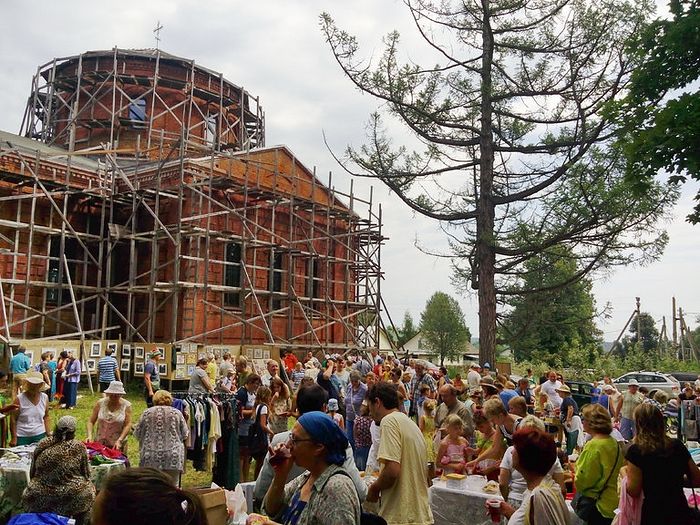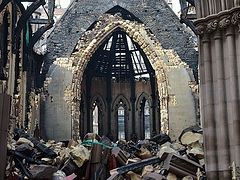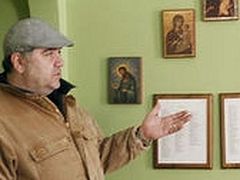Source: The New York Times
Trubetskoye, Russia, August 9, 2016
 The Orthodox Church of the Nativity in Trubetskoye, Russia, which is being restored with funds raised in charity events held by volunteers. Credit Vladas Parshin
The Orthodox Church of the Nativity in Trubetskoye, Russia, which is being restored with funds raised in charity events held by volunteers. Credit Vladas Parshin
Far from sinister headlines about matters like accusations that Russians hacked the Democratic Party in the United States, a few hundred people milled around the ruins of this village’s once-imposing Orthodox church.
Here was what one might call the other Russia, a local effort to raise funds in pursuit of the somewhat quixotic task of renovating the Church of the Nativity, once the place of worship attached to an aristocratic estate.
Scores of stall holders offered home-baked cakes and discarded books, paintings and handcrafted face scrubs. Eager buyers, mostly vacationers from summer dachas in and around the nearby town of Tarusa, scoured the stalls.
Dappled by sunlight, the redbrick ruins of the partly roofless church hosted singers and musicians. Three men and two women dressed as Cossacks sang and encouraged a few women to dance outside.
The idea for the church renovation came from Elina M. Loginova, 75, a retired engineering professor. She lives in this village of a few dozen homes and has minutely chronicled the lives of peasants, priests and nobility here before 1918.
The tranquil spot belies the violence of 20th-century Russia.
Among other things, “History of Our Church,” written by Ms. Loginova, charts the cruel fate of the priest who served here when the Bolshevik Revolution erupted in 1917.
Father Alexander V. Sokholov, who also ran a parish school and is pictured with his pupils in Ms. Loginova’s brochure, was gradually driven out and in 1930 sentenced to three years’ hard labor. He was eventually reunited afterward with his wife in the distant town of Tambov, only to be rearrested in Stalin’s Great Terror of 1937.
He was shot in 1938, but his name was rehabilitated in 1957, after Nikita S. Khrushchev denounced Stalin’s purges. His granddaughter and great-grandson learned of that decision only 50 years later, after researching his fate.
For the past three summers, Ms. Loginova has organized this charity fair, raising about 100,000 rubles, or about $1,500, at each of the first two events. This Sunday, her efforts yielded a pleasing 230,000 rubles.
She is well aware that the sum is paltry compared to the task but perseveres nonetheless. “I have only one thing to say,” she told the crowd at the fair. “Thank you, thank you, thank you.”
Her friend Natasha Smirnova, 71, a retired professor of West European languages who taught for decades at Moscow State University, was blunter.
“If each of you adds only a little today, that would be really great,” she told the crowd. “Don’t be stingy, open your purses!”
In a country where the state has traditionally maintained extensive control, private charity is still in relative infancy. Foundations and groups that receive funds from abroad usually must register as foreign actors.
Restoring churches is one area where Russians have seized the volunteer spirit, however. Both churches in Tarusa have been restored with a mixture of state, church and private resources. A local businessman funded the lavish restoration of a church in another village, Istomino, the parish of Leo Tolstoy’s great-grandfather.
In Tarusa, another businessman, Ismail Akhmetov, has built the House of Literature — complete with gallery and concert hall — on the riverside estate where the poet Marina Tsvetayeva once spent her summers.
He also supports the local art school and young musicians. The clans of artists who have gathered in Tarusa for decades are building new studios for artists in residence.
Ivan Milyaev, 53, an artist and theater director who like several here splits time between the Tarusa region and Moscow, confided that he was giving a new icon to the Trubetskoye church.
He also hopes to persuade the architect grandson of Boris Pasternak, the Nobel literature laureate, to donate his time to advise on further structural repairs to the building. The church, like many here, was built on a rise, a defining sight in the sheer vastness of Russia’s landscapes.
“The icons disappeared,” noted Mr. Milyaev, who has exhibited at the United Nations building in New York and knows how big philanthropy is in the United States. “Of course the Bolsheviks took them all and they went missing.”
Now, slowly, something of the past is being restored.


